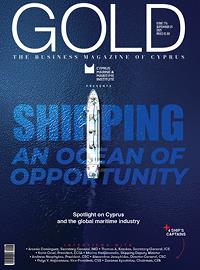Artificial intelligence and hybrid work are transforming Europe’s banking sector, reshaping employee roles, work models, and required skills, said Jens Thau, Chairman of the Banking Committee for European Social Affairs (BCESA) of the European Banking Federation (EBF).
In an interview with CNA ahead of the Committee’s meeting in Limassol on 19 September, Thau explained that while automation will take over routine and repetitive tasks, new opportunities are emerging in advisory, analytical, and client-facing roles.
AI brings major shifts
“Employees in European banks can expect significant changes in their working conditions as AI and automation become more integrated into operations. This will lead to more flexibility and healthier working environments,” he said.
He pointed to the Joint Declaration on Employment Aspects of Artificial Intelligence by European Social Partners, noting that back-office functions, compliance, fraud detection, and customer service will increasingly be automated.
“Customer advisors are working increasingly in AI-supported digital environments, altering the nature of client interactions and requiring new digital competencies,” he added.
Personnel planning, recruitment, and performance analytics are also being reshaped by AI tools, he said, stressing that banks are investing heavily in reskilling as simpler tasks are phased out.
Thau emphasized that these changes will allow employees to concentrate on advisory, analytical, and client-facing roles.
Hybrid work now the norm
Regarding the organisation of work, he cited a recent study form EBF showing that hybrid work is now the norm. He stressed that combining office and remote work is firmly established in private banking and will remain a key feature.
“Over half of employees work in a hybrid environment, and more than three-quarters work away from the office at least occasionally. Hybrid work is present in all areas, not just IT or back office, but also investment, corporate, and retail banking. Employees can expect this trend to continue,” Thau said.
He noted that hybrid arrangements are linked to better well-being. “Stress, exhaustion, and depressive moods are reported less frequently among hybrid workers than the overall average,” he explained. Flexibility, he added, supports employees with care obligations and makes banking more attractive as an employer.
Still, challenges remain. Productivity, cohesion across distributed teams, and the digital divide are key concerns, as he noted.
“A key point from a social partner perspective will remain bridging the digital divide and ensuring proper and cost-efficient infrastructure for access, including AI,” he said.
He pointed out that not all regions or institutions are equally equipped for remote work, creating disparities in employee experience and performance.
Banks, Thau noted, are addressing the human side of hybrid work by launching programmes to prevent isolation and maintain engagement.
Initial hurdles in coordinating teams, Thau noted, are largely behind them with both employees and executives now rating goal achievement and efficiency as above average.
“Team and management quality remain high, with trust and communication working well across locations,” he said.
He also stressed that flexibility continues to be a powerful incentive.
“Flexible work locations and hours continue to be important for attracting talent. Employees with more freedom to choose where they work also enjoy more flexible hours, leading to higher satisfaction with working time arrangements. Hybrid workers actually work shorter hours and less overtime than others, countering concerns about overwork,” he said.
Four-day week debate
The idea of a four-day week, tabled by Cypriot banking unions, sits uneasily within the European debate, according to Thau.
“The proposal by Cypriot banking unions for a four-day work week fits into a growing European conversation about flexible work models,” he acknowledged. But, he added, “with the flexible work patterns already in place, we feel that the four-day work week as a general pattern is losing attractiveness.”
“It is not convincing to call for reduction of daily working time and then advocate for longer working days in a four-day work week,” he stressed.
Current flexible arrangements, he stressed, already allow many employees to adjust their schedules in ways that can resemble a shorter week when needed. The overriding concern, though, remains ensuring clients have uninterrupted access to services.
“Around all these discussions securing the availability of services to our clients is key”, he said.
Instead of fixed reductions, he added, European banking social partners prefer to actively discuss general flexible models, including reduced hours, as part of broader employment strategies.
As Thau puts it, “the answer is not another model of fixed working days but rather support work-life balance through work flexibility regarding time and place.”
He also noted that according to studies, 85% of hybrid workers currently rate their work-life balance positively which six percentage points above the average for all employees.
Skills of the future
Asked about the skills that will shape the banking workforce of tomorrow, Thau referred to a mix of traditional strengths and new digital competencies. The sector, he explained, will demand not only financial expertise but also fluency in data and artificial intelligence.
“All employees will need to reach and maintain data literacy and AI fluency. Understanding how to work with AI tools, interpret analytics, and manage digital workflows will be essential, as well as the ability to work with digital tools and with and in AI-driven processes,” he said.
Remote collaboration skills, ensuring effective communication and teamwork across locations, will also be indispensable.
Beyond these general requirements, Thau highlighted several areas where demand is set to rise. As banks increase their exposure to green assets, portfolio managers with ESG (Environmental, social, and governance) expertise will be in high demand. The push toward digitalisation, he added, also creates growing demand for cybersecurity and regulatory specialists.
At the same time, he stressed that human-centric roles will not disappear in an age of automation. Relationship-building, judgment, and empathy will remain vital, particularly in private banking, investment advisory, and human resources.
Managing risks
When asked about the biggest social and employment-related risks for the European banking sector, Thau noted that even the biggest risks lose their negative impact if managed well. He noted that banks are already putting structures in place and training staff to anticipate problems before they escalate.
Among the main risks he identified is automation, which could phase out lower-skilled roles, particularly in customer service and operations. But he also said that demographics pose another challenge.
“The number of personnel retiring in the next ten years outweighs even the most pessimistic assumptions of job-losses through new technology,” Thau explained, making retention and retraining of staff essential as the workforce ages.
He added that hybrid work, while generally positive for well-being, also requires careful management. Programs must be in place to monitor and support employees who may feel isolated in remote setups.
Speaking about the role of the Banking Committee for European Social Affairs (BCESA) he said that it can “help by facilitating Social Dialogue at all levels by providing joint social partners’ position for the most pressing employment issues in the European Banking Sector.” As he said, rather than each country or institution working separately, joint statements and European declarations allow for coordinated and efficient solutions.
Thau stressed the importance of monitoring new developments across the continent, from hybrid work arrangements to the deployment of artificial intelligence. He pointed to a particular responsibility in shaping the way AI is introduced in banking, ensuring its transparent and ethical use, especially in areas like human resources and decision-making.
(Source: CNA)









